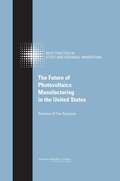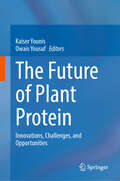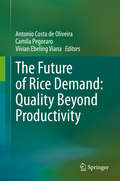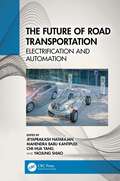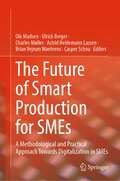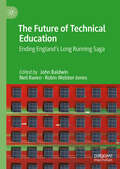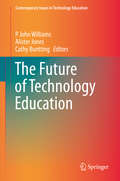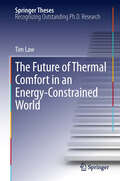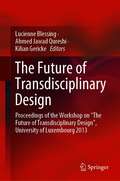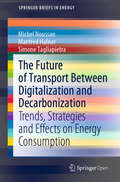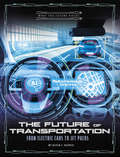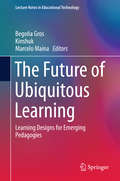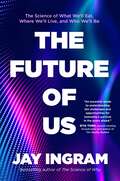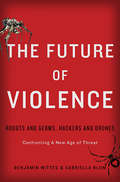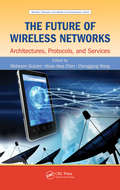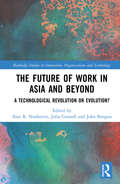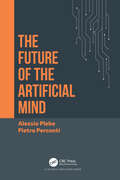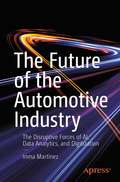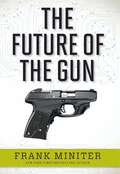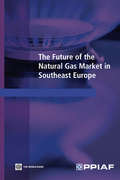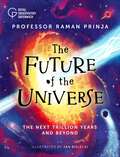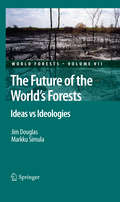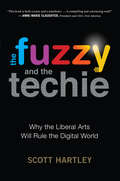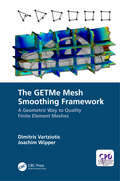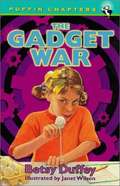- Table View
- List View
The Future of Photovoltaic Manufacturing in the United States
by The National Academy of SciencesThe symposia, held in April and July 2009, were part of an ongoing program to analyze and evaluate state and local incentives to attract manufacturing. Representatives of producers of photovoltaics, congressional staff, academics, industry analysts, and representatives from relevant government agencies discussed opportunities and challenges facing photovoltaic manufacturing in the US, national and international consortia, the economics of photovoltaics in the US, flex display as the next generation, state and regional innovation initiatives, the Department of Energy advancing solar technologies, contributions from other federal agencies, intermediating institutions, and building a solar photovoltaic roadmap. The summary is not indexed. Annotation ©2012 Book News, Inc. , Portland, OR (booknews. com)
The Future of Plant Protein: Innovations, Challenges, and Opportunities
by Kaiser Younis Owais YousufThis book presents plant proteins as sustainable and healthy substitutes for animal proteins, highlighting innovations, challenges, and opportunities. Chapters cover emerging sources like duckweed, microalgae, quinoa, and hemp, comparing their nutritional aspects with traditional sources such as soybeans, beans, and nuts. Further chapters not only discuss the environmental impact, production methods, and potential applications of plant protein but also address barriers like consumer perception, affordability, and distribution. The book provides solutions from plant-based food companies to these challenges, tackling the rising global demand driven by population growth, income increase, urbanization, environmental awareness, health consciousness, and animal welfare concerns. Overall, it provides a summary of plant proteins, exploring their nutritional, environmental, and consumer-related aspects in the context of a shifting protein landscape. The book is relevant forfood scientists and technologists, nutritionists, policymakers, and professionals alike providing insights into plant-based diets and the future of food.
The Future of Rice Demand: Quality Beyond Productivity
by Antonio Costa de Oliveira Camila Pegoraro Vívian Ebeling VianaThis book aims to provide an overview of the challenges and available technologies to improve rice and provide a response to the challenge posed by increasing world population and the resultant food shortages. Nutritional aspects of rice products and omics and the molecular technologies currently being used are covered in depth. As a staple food for over 50% of the world´s population, an estimated 9 billion people will need to be fed by 2050, and healthy and uncontaminated foods need to reach consumers in developed and developing countries.This makes quality beyond productivity incredibly important and is one of the overriding themes of this work. The Future of Rice Demand: Quality Beyond Productivity offers researchers a better understanding of the nutritional aspects of rice. Omics technologies applied to cereal grain quality have been scarce in the literature published to date, making this text an excellent single source for researchers in regions where rice is a major crop. The first section of the book focuses on the major aspects of the industrial processing of all rice types. Further sections look at contamination prevention and biofortification, special rice types, and omics and other molecular tools used in the mass production and processing of healthy rice products.
The Future of Road Transportation: Electrification and Automation
by Jeyaprakash Natarajan Mahendra Babu Kantipudi Che-Hua Yang Yaojung ShiaoThe Future of Road Transportation presents rapidly growing research towards electrified and automated vehicles. It explains the workings and drawbacks of a conventional vehicle’s powertrain, braking, and steering systems before exploring ADAS equipment and driverless car technologies. Emphasizing the necessary changes in conventional transport systems towards sustainable and smart mobility, this book discusses advanced future mobility technologies and the challenges and considerations for developing sustainable vehicle designs. It overviews the construction details and the research-level contents of the power train, battery, charging infrastructure, and other control systems of the electrical vehicles. The book is intended for automotive and electrical engineers and researchers working on electric vehicle technology, autonomous and automated vehicles, automotive sustainability. It will also be useful for mechanical and electrical engineering students taking courses in Automotive/Vehicle Engineering and Automotive Systems and Design.
The Future of Smart Production for SMEs: A Methodological and Practical Approach Towards Digitalization in SMEs
by Charles Møller Ulrich Berger Ole Madsen Astrid Heidemann Lassen Brian Vejrum Waehrens Casper SchouThis book explains and exemplifies how SMEs can embrace the Smart Production approach and technologies in order to gain a beneficiary outcome. The book describes the Smart Production vision for SMEs, as well as the method to get there. The concept behind the book is based on the long-term experience of the authors in researching and tackling problems of SMEs in the manufacturing sector. The book provides applied methods and obtained solutions in different branches and different sizes of SMEs, encompassing a broad survey of our markets and societies. The perspective is systemic/holistic and integrated including human, organizational, technological, and digital perspectives.
The Future of Technical Education: Ending England's Long Running Saga
by John Baldwin Neil Raven Robin Webber-JonesThis book provides an evidence-informed vision of the future of technical education in England. Drawing on creative and innovative ideas, contributions analyse the current drivers to improve provision and the legacy of lessons learned from England’s historical systemic underperformance in developing accessible, high quality technical education. In addition to exploring the dynamics of the political and economic drivers for resetting the technical education agenda, the volume includes an important social justice perspective by exploring social mobility considerations linked to the government’s levelling up agenda, place-based interventions and differential access to skills training. Drawing on current and previous policy discourse and implementation, the book provides a forward-looking view, with recommendations of how high quality technical education could be developed to meet the needs of individuals, the economy and society. It will appeal to students, academics and practitioners with an interest in technical education in further and higher education settings.
The Future of Technology Education
by P John Williams Alister Jones Cathy BunttingTwenty-five years ago there was increasing optimism in policy, curriculum and research about the contribution that technology education might make to increased technological literacy in schools and the wider population. That optimism continues, although the status of technology as a learning area remains fragile in many places. This edited book is offered as a platform from which to continue discussions about how technology education might progress into the future, and how the potential of technology education to be truly relevant and valued in school learning can be achieved. The book results from a collaboration between leading academics in the field, the wider group of authors having had input into each of the chapters. Through the development of a deep understanding of technology, based on a thoughtful philosophy, pathways are discussed to facilitate student learning opportunities in technology education. Consideration is given to the purpose(s) of technology education and how this plays out in curriculum, pedagogies, and assessment. Key dimensions, including design, critique, students' cultural capital are also explored, as are the role and place of political persuasion, professional organisations, and research that connects with practice. The discussion in the book leads to a conclusion that technology education has both an ethical and moral responsibility to support imaginings that sustain people and communities in harmony and for the well being of the broader ecological and social environment.
The Future of Thermal Comfort in an Energy- Constrained World
by Tim LawThe dissertation investigates the scientific and business factors that have resulted in air-conditioning being a major contributor to climate-change. With his architectural background, the author demonstrates how a design methodology, not commonly adopted in scientific studies, may actually be a suitable way of dealing with a complex problem: the 'business as usual' scenario involving building science, sociological values and consumer behavior. Using his innovations as case studies, the author shows how good ideas cannot be evaluated on scientific merit alone and demonstrates why commercialization may have a pivotal role in deployment of research-based technology. He advances the theory of personalized thermal comfort which can potentially resolve the air-conditioning conundrum.
The Future of Transdisciplinary Design: Proceedings of the Workshop on “The Future of Transdisciplinary Design”, University of Luxembourg 2013
by Kilian Gericke Lucienne Blessing Ahmed Jawad QureshiThis book presents the state-of-the-art research in the field of transdisciplinary design, and highlights the challenges and issues from the perspectives of processes, people and products in transdisciplinary product design and development. It collates research papers resulting from the ‘Workshop on the Future of Transdisciplinary Design’ written by leading researchers in engineering design and product development. The papers provide examples and case studies from existing practices, as well as future perspectives towards the development of the complex and ever-changing domains of engineering design and product development, with an emphasis on transdisciplinarity. ‘The Future of Transdisciplinary Design’ contains a selection of research papers in the following areas related to transdisciplinary design: -Approaches-Tools and methods-Management and collaboration-Distributed and culturally diverse teams-Modeling, representing and managing information-Education and training A transdisciplinary design process is a design process involving the integrated use of knowledge, methods and tools from various disciplines. Design of product/services increasingly requires cross-disciplinary collaboration, and integration of specialized knowledge from different disciplines is necessary to tackle complex and large scale design problems. This book provides a valuable reference to researchers, professionals and PhD students in the field of engineering design and product development. Design practitioners and those involved in product development in the manufacturing industry will equally benefit from the research presented as well as future advances in this research.
The Future of Transport Between Digitalization and Decarbonization: Trends, Strategies and Effects on Energy Consumption (SpringerBriefs in Energy)
by Simone Tagliapietra Manfred Hafner Michel NoussanEnergy systems are rapidly transitioning towards decarbonization, thanks in part to innovative digital technologies and changing mobility demands. This open access book examines the decarbonization and digitalization transformation in the transport sector, with a particular focus on energy consumption. By studying historical trends and outlining future scenarios, the authors illustrate the evolution of energy consumption in the transport sector, compare alternative decarbonization strategies, and analyze digitalization trends and their effects on energy consumption. The book addresses a broad readership of both academics and professionals working in the energy and transport industries, as well as readers interested in the ongoing debate over energy, mobility and climate change.
The Future of Transportation: From Electric Cars to Jet Packs (What the Future Holds)
by Alicia Z. KlepeisHuman transportation has come a long way since the invention of the wheel. Vehicles of all sorts have us speeding across land, through water, and in the skies. What might be next? From self-driving cars to jet packs, readers will discover exciting new ways they may get around in the future.
The Future of Ubiquitous Learning
by Kinshuk Begoña Gros Marcelo MainaThis book explores emerging pedagogical perspectives based on the design of new learning spaces supported by digital technologies and brings together some of the best research in this field. The book is divided into three themes: foundations of emerging pedagogies, learning designs for emerging pedagogies and, adaptive and personalized learning. The chapters provide up-to-date information about new pedagogical proposals, and examples for acquiring the requisite skills to both design and support learning opportunities that improve the potential of available technologies.
The Future of Us: The Science of What We'll Eat, Where We'll Live, and Who We'll Be
by Jay IngramA fascinating look at the cutting-edge science and technologies that are on the cusp of changing everything from where we&’ll live, how we&’ll look, and who we&’ll be, by the popular science broadcaster and bestselling author Jay Ingram.Where will we live? How will we get around? What will we look like? These are just some of the questions bestselling author and popular science broadcaster Jay Ingram answers in this exciting examination of the science and technologies that will affect every aspect of human life. In these pages, Ingram explores the future of our technological civilization. He reports on cutting-edge research in organ and limb regeneration, advances in prosthetics, the merging of the human and the synthetic, and gene editing. Vertical farming and lab-grown food might help feed millions and alleviate pressure on the planet. Cities could accommodate green space and the long-awaited flying car. Finally, he speculates on the future of artificial general intelligence, even artificial superintelligence, as well as our place on Earth and in the universe. The potential impact of these developments in science and technology will be powerful and wide-ranging, complicated by ethics and social equity. And they will inevitably revolutionize every aspect of life and even who we are. This is The Future of Us.
The Future of Violence: Robots and Germs, Hackers and Drones-Confronting A New Age of Threat
by Benjamin Wittes Gabriella BlumThe ability to inflict pain and suffering on large groups of people is no longer limited to the nation-state. New technologies are putting enormous power into the hands of individuals across the world--a shift that, for all its sunny possibilities, entails enormous risk for all of us, and may even challenge the principles on which the modern nation state is founded. In short, if our national governments can no longer protect us from harm, they will lose their legitimacy. Detailing the challenges that states face in this new world, legal scholars Benjamin Wittes and Gabriella Blum controversially argue in [Title TK] that national governments must expand their security efforts to protect the lives and liberty of their citizens. Wittes and Blum show how advances in cybertechnology, biotechnology, and robotics mean that more people than ever before have access to technologies--from drones to computer networks and biological data--that could possibly be used to extort or attack states and private citizens. Security, too, is no longer only under governmental purview, as private companies or organizations control many of these technologies: internet service providers in the case of cyber terrorism and digital crime, or academic institutions and individual researchers and publishers in the case of potentially harmful biotechnologies. As Wittes and Blum show, these changes could undermine the social contract that binds citizens to their governments. In this brave new world of dispersed threats, Wittes and Blum persuasively argue that the best means for safeguarding our liberty and privacy are strong governmental surveillance and security networks. Indeed, they show--through engaging looks at political thinkers from Thomas Hobbes to the Founders and beyond--that security and liberty are mutually supportive, rather than existing in a precarious balance in which the increase in one leads to a proportional decrease in the other. And not only must we bolster our domestic security efforts, but we must think internationally. Our best defense is increasingly a transnational one: more multinational forces and greater action to protect (and protect against) the territory of weaker states who do not yet have the capability to police themselves. [Title TK] is at once an exposé of our emerging world--one in which students can print guns with 3-D printers and scientists’ manipulations of viruses can be recreated and unleashed by ordinary people--and an authoritative blueprint for how government and individuals must adapt to it.
The Future of Wireless Networks: Architectures, Protocols, and Services
by Chonggang Wang Mohesen Guizani Hsiao-Hwa ChenThe exponential increase in mobile device users and high-bandwidth applications has pushed the current 3G and 4G wireless networks to their capacity. Moreover, it is predicted that mobile data traffic will continue to grow by over 300 percent by 2017. To handle this spectacular growth, the development of improved wireless networks for the future ha
The Future of Work in Asia and Beyond: A Technological Revolution or Evolution? (Routledge Studies in Innovation, Organizations and Technology)
by Julia Connell John Burgess Alan R. NankervisThe Future of Work in Asia and Beyond presents the findings and associated implications arising from a collaborative research study conducted on the potential impact of the Fourth Industrial Revolution (4IR – or Industry 4.0) on the labour markets, occupations and associated future workforce competencies and skills across ten countries. The 4IR concerns the digital transformation in society and business – an interface between technologies in the physical, digital and biological disciplines. The book explores many related issues: the nature of the 4IR, as well as demographic, generational and socio-cultural issues, economic and political perspectives, public and private sector similarities and differences, business strategy and managerial implications, human resource management/planning strategies, policies and practices, industry innovations, ‘best practice’ cases and comparative country studies. Chapters are based on a framework which combines labour market and multiple stakeholder theories. Issues are explored through the perceptions of organisational managers based in Australia, China, India, Indonesia, Malaysia, Mauritius, Nepal, Singapore, Taiwan and Thailand to provide an analysis of organisational, industry and government preparedness for the 4IR. This book is recommended reading for anyone wanting to gain an understanding of the 4IR and a range of related challenges and issues, as well as suggested strategies for governments, education and industry that are necessary to address them.
The Future of the Artificial Mind
by Pietro Perconti Alessio PlebeThe Future of the Artificial Mind is about the social and technological challenges posed by the new wave of artificial intelligence, both from a technical and a cognitive perspective. Deep neural networks have brought about tremendous technological improvements. This renaissance in artificial intelligence, after decades of stagnation, has enabled new technologies capable of surpassing human performance, as in the case of visual recognition. The book reviews the key ideas that have enabled these goals to be achieved and their historical origins. The book also considers some of the ethical and social challenges that the future development of artificial intelligence will face. Will humans fall in love with future android dolls? What will artificial sex be like? And what will it be like to travel in cars that will treat us as passengers instead of drivers? But predicting the future appears more magic than science. But when it comes to artificial intelligence, it is a constant temptation. Since it is well known that "the only way to get rid of a temptation is to enjoy it!", the hypothesis considered in the last chapter is that emerging trends point to a near future in which intelligence will be ubiquitous, but it will be difficult to identify its bearer. We may be heading towards an era of widespread intelligence, but an intelligence without accountability.
The Future of the Automotive Industry: The Disruptive Forces of AI, Data Analytics, and Digitization
by Inma MartínezNothing defined the 20th century more than the evolution of the car industry. The 2020 decade will see the automotive industry leap forward beyond simply moving people geographically toward a new purpose: to become a services industry. This book takes readers on a journey where cars will evolve towards becoming “computers on wheels."The automotive industry is one of the sectors most profoundly changed by digitalization and the 21st century energy needs. You'll explore the shifting paradigms and how cars today represent a new interpretation of what driving should be and what cars should offer. This book presents exciting case studies on how artificial intelligence (AI) and data analytics are used to design future cars, predict car efficiency, ensure safety and simulate engineering dynamics for its design, as well as a new arena for IoT and human data. It opens a window into the origins of cars becoming software-run machines, first to run internal diagnostics, and then to become machines connected to other external machines via Bluetooth, to finally the Internet via 5G.From transportation to solving people’s problems, The Future of the Automotive Industry is less about the technology itself, but more about the outcomes of technology in the future, and the transformative power it has over a much beloved item: cars.What You’ll LearnExplore smart cities and their evolution when it comes to traffic and vehiclesGain a new perspective on the future of cars and transportation based on how digital technologies will transform vehicles Examine how AI and IoT will create new contexts of interactions with drivers and passengers alikeReview concepts such as personalizing the driving experience and how this will take formSee how self-driving cars impact data mining of personal dataWho This Book Is ForAnyone with an interest in digital advancements in the automotive industry beyond the connected car.
The Future of the Gun
by Frank MiniterThe history of the American gun is intricately entwined with the history of America itself. Promising developments in gun technology could change not only America's future, but the future of the world. Unfortunately, the radical anti-gun lobby is standing between innovation and the American people. Bestselling author Frank Miniter details the amazing breakthroughs waiting to happen in gun technology that could make today's firearms exponentially safer and smarter-if the anti-gun lobby weren't halting progress in its tracks.In The Future of the Gun, you will learn:Why anti-gun groups often oppose gun safetyfeatures How guns-and gun education for young people-cut crime How federalism could save your gun rights New trends in gun technology that will make guns safer and more effectiveWhy most talk about "assault rifles" is bogus How military and civilian gun technology have always advanced in tandem-for the benefit of soldiers and private citizens What guns could look like in just a few yearsWant to know about the future of guns? There is no better place to start than here.ter, more powerful handguns at prices (when adjusted for inflation) the world has never seen.Taurus, a Brazilian gun maker, played with using 3D printers to make guns over a decade ago. A Texas manufacturer has now made Model 1911 pistols out of steel with 3D printers ... the genie is out of the bottle.
The Future of the Natural Gas Market in Southeast Europe
by Franz GernerThis study was to analyze the future role of natural gas in the energy mix of countries of South East Europe. The study further identifies regional, cross-border and country-specific gas infrastructure projects that are economically, financially and technically sound. The study also analyses, and makes proposals for, the institutional and policy issues relating to funding and implementing gas infrastructure projects. The study examines sources of gas supply from Russia, the Caspian region and other current and prospective producer countries through Turkey and other transit routes (including LNG) and assesses costs of supply and gasification prospects in nine gas markets in the South East Europe region: * Albania * Bosnia and Herzegovina * Bulgaria * Croatia * Kosovo * Macedonia * Montenegro * Romania * Serbia These markets are all signatories of the Athens Memoranda of 2002 and 2003, which commit the participants to regional cooperation in electricity and gas.
The Future of the Universe
by Raman PrinjaExperience the explosive and colourful future of the cosmos, zooming trillions of years ahead in time with Professor Raman Prinja, published in association with Royal Observatory Greenwich.The Future of the Universe starts the future clock NOW and rockets readers along a forward time line to discover what scientists predict will happen to the universe, including a shiny new ring on Mars, Earth's axis flip and a dramatic galaxy crash!This is the first book of its kind for this age - putting all the future events into one place along a clear timeline, from the return of famous comets in a few decades, to the dark end of the Universe a nonillion years from now.Professor Raman Prinja is the international, multi-award-winning Head of Department for Physics and Astronomy at University College London and a celebrated children's author of many books, including Planetarium and Wonders of the Night Sky. Illustrator Jan Bielecki's action-packed, vivid artwork plucks these astonishing phenomena out of the distant future, and explodes them on the page - sizzling red giant stars and deep, mysterious dark energy; doomed moons and trailing comets - they're all inside The Future of the Universe!Professor Prinja pens this unique look at the Universe's future as his follow-up to the definitive and exciting Wonders of the Night Sky, which introduces anyone with a patch of sky and a curious mind to exploring the marvels on display in today's Universe. The next generation of Universe explorers can easily engage with astronomy through these stunning books, no expensive equipment needed.
The Future of the World's Forests: Ideas vs Ideologies
by Markku Simula Jim DouglasAt the landmark 1992 United Nations Conference on Environment and Development (Earth Summit), solemn resolutions were made both to protect the world's biodiversity and to co-operate on managing natural forests in a sustainable and ecologically responsible way. If anything, given recent developments in issues such as climate change and poverty, the problem of protecting and sustaining forests should logically have become more important globally. Yet public interest in, and development support for, forest activities have declined and rates of forest loss remain stubbornly high. Why has this happened? This book seeks answers to this question. It examines the often dysfunctional relationships between various members of the international forest constituency, which have so often prevented the formation of consensus. It also explores the tendency to pursue technical and politically convenient 'fixes' focused on the internal workings of the forest sector, while ignoring the overwhelming influence of external forces on the fate of forests. The result, all too often, has been programs which benefit a few powerful players and fail to provide real solutions. The book provides a new examination of and perspective on the international forest policy debate. It clarifies the reasons for global forest conflicts and provides insight for future policy development. Including examples from both the developed and developing world, it provides an invaluable resource for researchers and graduate students in forest policy and international relations, as well as a useful reference for policymakers and professionals in the forest sector, the development community and conservationists. With significant global attention now focused on reducing carbon emissions from deforestation and forest degradation (REDD), the authors examine the promise and the potential problems that apply to this initiative.
The Fuzzy and the Techie: Why the Liberal Arts Will Rule the Digital World
by Scott Hartley&“Artfully explains why it is time for us to get over the false division between the human and the technical.&”—Tim Brown, CEO of IDEO and author of Change by Design Scott Hartley first heard the terms fuzzy and techie while studying political science at Stanford University. If you majored in humanities or social sciences, you were a fuzzy. If you majored in computer or hard sciences, you were a techie. While Silicon Valley is generally considered a techie stronghold, the founders of companies like Airbnb, Pinterest, Slack, LinkedIn, PayPal, Stitch Fix, Reddit, and others are all fuzzies—in other words, people with backgrounds in the liberal arts. In this brilliantly counterintuitive book, Hartley shatters assumptions about business and education today: learning to code is not enough. The soft skills—curiosity, communication, and collaboration, along with an understanding of psychology and society&’s gravest problems—are central to why technology has value. Fuzzies are the instrumental stewards of robots, artificial intelligence, and machine learning. They offer a human touch that is of equal—if not greater—importance in our technology-led world than what most techies can provide. For anyone doubting whether a well-rounded liberal arts education is practical in today&’s world, Hartley&’s work will come as an inspiring revelation. Finalist for the 2016 Financial Times/McKinsey Bracken Bower Prize and A Financial Times Business Book of the Month
The GETMe Mesh Smoothing Framework: A Geometric Way to Quality Finite Element Meshes
by Joachim Wipper Dimitris VartziotisHigh quality meshes play a key role in many applications based on digital modeling and simulation. The finite element method is a paragon for such an approach and it is well known that quality meshes can significantly improve computational efficiency and solution accuracy of this method. Therefore, a lot of effort has been put in methods for improving mesh quality. These range from simple geometric approaches, like Laplacian smoothing, with a high computational efficiency but possible low resulting mesh quality, to global optimization-based methods, resulting in an excellent mesh quality at the cost of an increased computational and implementational complexity. <P><P>The geometric element transformation method (GETMe) aims to fill the gap between these two approaches. It is based on geometric mesh element transformations, which iteratively transform polygonal and polyhedral elements into their regular counterparts or into elements with a prescribed shape. GETMe combines a Laplacian smoothing-like computational efficiency with a global optimization-like effectiveness. The method is straightforward to implement and its variants can also be used to improve tangled and anisotropic meshes. <P><P>This book describes the mathematical theory of geometric element transformations as foundation for mesh smoothing. It gives a thorough introduction to GETMe-based mesh smoothing and its algorithms providing a framework to focus on effectively improving key mesh quality aspects. It addresses the improvement of planar, surface, volumetric, mixed, isotropic, and anisotropic meshes and addresses aspects of combining mesh smoothing with topological mesh modification. <P><P>The advantages of GETMe-based mesh smoothing are demonstrated by the example of various numerical tests. These include smoothing of real world meshes from engineering applications as well as smoothing of synthetic meshes for demonstrating key aspects of GETMe-based mesh improvement. Results are compared with those of other smoothing methods in terms of runtime behavior, mesh quality, and resulting finite element solution efficiency and accuracy. <P><P>Features: <li>Helps to improve finite element mesh quality by applying geometry-driven mesh smoothing approaches. <li>Supports the reader in understanding and implementing GETMe-based mesh smoothing. <li>Discusses aspects and properties of GETMe smoothing variants and thus provides guidance for choosing the appropriate mesh improvement algorithm. <li>Addresses smoothing of various mesh types: planar, surface, volumetric, isotropic, anisotropic, non-mixed, and mixed. <li>Provides and analyzes geometric element transformations for polygonal and polyhedral elements with regular and non-regular limits. <li>Includes a broad range of numerical examples and compares results with those of other smoothing methods.
The Gadget War
by Betsy DuffeyMEET THE GADGET WHIZ.. Kelly Sparks has forty-three inventions to her credit -- and she's only in third grade! Just name a problem, and in no time Kelly will come up with a gadget to solve it. But when Albert Einstein Jones walks into Kelly's class, he becomes Kelly's stickiest problem yet! Albert's been to Young Inventor's Camp, and he's determined to prove who the real gadget whiz is. This is sure to be a mastermind fight to the finish!
